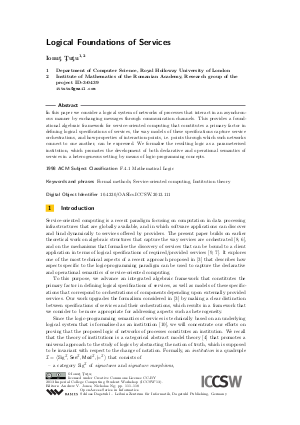Logical Foundations of Services
Author Ionut Tutu
-
Part of:
Volume:
2013 Imperial College Computing Student Workshop (ICCSW 2013)
Part of: Series: Open Access Series in Informatics (OASIcs) - License:
 Creative Commons Attribution 3.0 Unported license
Creative Commons Attribution 3.0 Unported license
- Publication Date: 2013-10-14
File

PDF
OASIcs.ICCSW.2013.111.pdf
- Filesize: 0.62 MB
- 8 pages
Document Identifiers
Subject Classification
Keywords
- Formal methods
- Service-oriented computing
- Institution theory
Metrics
- Access Statistics
-
Total Accesses (updated on a weekly basis)
0PDF Downloads0Metadata Views
Abstract
In this paper we consider a logical system of networks of processes that interact in an asynchronous manner by exchanging messages through communication channels. This provides a foundational algebraic framework for service-oriented computing that constitutes a primary factor in defining logical specifications of services, the way models of these specifications capture service orchestrations, and how properties of interaction-points, i.e. points through which such networks connect to one another, can be expressed. We formalise the resulting logic as a parameterised institution, which promotes the development of both declarative and operational semantics of services in a heterogeneous setting by means of logic-programming concepts.
Cite As Get BibTex
Ionut Tutu. Logical Foundations of Services. In 2013 Imperial College Computing Student Workshop. Open Access Series in Informatics (OASIcs), Volume 35, pp. 111-118, Schloss Dagstuhl – Leibniz-Zentrum für Informatik (2013)
https://doi.org/10.4230/OASIcs.ICCSW.2013.111
BibTex
@InProceedings{tutu:OASIcs.ICCSW.2013.111,
author = {Tutu, Ionut},
title = {{Logical Foundations of Services}},
booktitle = {2013 Imperial College Computing Student Workshop},
pages = {111--118},
series = {Open Access Series in Informatics (OASIcs)},
ISBN = {978-3-939897-63-7},
ISSN = {2190-6807},
year = {2013},
volume = {35},
editor = {Jones, Andrew V. and Ng, Nicholas},
publisher = {Schloss Dagstuhl -- Leibniz-Zentrum f{\"u}r Informatik},
address = {Dagstuhl, Germany},
URL = {https://drops.dagstuhl.de/entities/document/10.4230/OASIcs.ICCSW.2013.111},
URN = {urn:nbn:de:0030-drops-42793},
doi = {10.4230/OASIcs.ICCSW.2013.111},
annote = {Keywords: Formal methods, Service-oriented computing, Institution theory}
}
